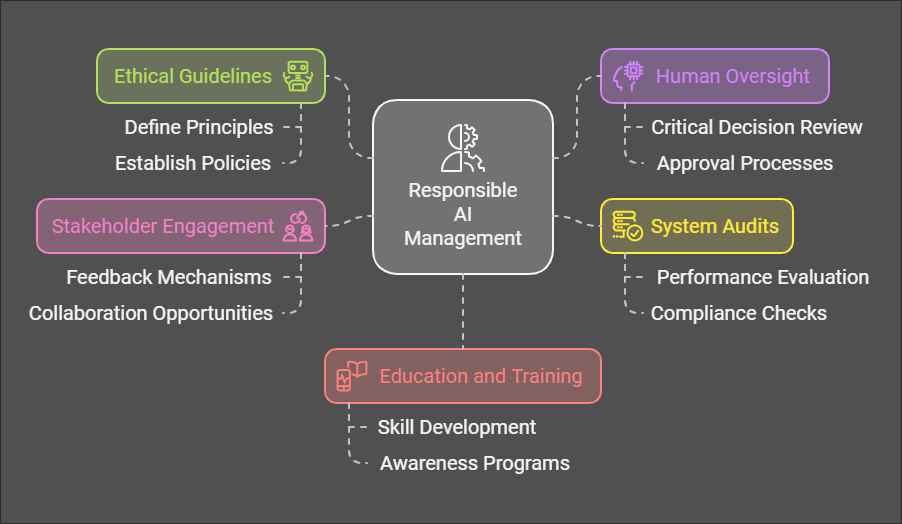Explore the complex ethical challenges of integrating AI in project management, from data privacy concerns to workforce impacts.
Executive Summary
The integration of artificial intelligence in project management presents both unprecedented opportunities and significant ethical challenges. As organizations rapidly adopt AI-powered project management tools, project leaders must navigate complex moral considerations while balancing efficiency gains with human-centric values. This comprehensive guide explores the key ethical challenges and provides practical frameworks for responsible AI implementation in project management.
Introduction: The AI Revolution in Project Management
The project management landscape is undergoing a profound transformation driven by artificial intelligence. From automated scheduling to predictive analytics and risk assessment, AI tools are revolutionizing how projects are planned, executed, and monitored. However, this technological advancement brings forth significant ethical considerations that organizations must address proactively.
The Current State of AI in Project Management
Modern project management tools increasingly incorporate AI capabilities such as:
- Automated resource allocation
- Intelligent scheduling algorithms
- Predictive risk analysis
- Natural language processing for documentation
- Machine learning-based performance tracking
These innovations promise enhanced efficiency and data-driven decision-making, but they also raise important ethical questions about their impact on various stakeholders.
Key Ethical Challenges
Data Privacy and Security
One of the foremost ethical concerns in AI-driven project management is data privacy. Project management systems often handle sensitive information, including:
- Personal employee data
- Confidential business information
- Client details and communications
- Financial projections and metrics
Organizations must ensure robust data protection measures while maintaining the utility of AI systems. This includes implementing:
- Strong data encryption protocols
- Clear data retention policies
- Transparent data usage guidelines
- Regular security audits and updates
Workforce Impact and Human Dignity
The integration of AI in project management raises significant questions about its impact on the workforce. Project managers and team members may face:
- Role displacement or transformation
- Reduced autonomy in decision-making
- Increased monitoring and surveillance
- Changes in skill requirements and job descriptions
Organizations must carefully balance automation benefits with maintaining human dignity and job satisfaction. This includes:
- Providing clear communication about AI implementation
- Offering training and upskilling opportunities
- Maintaining meaningful human oversight
- Preserving autonomy in critical decisions
Bias and Fairness in AI-Driven Decision Making
AI systems can inadvertently perpetuate or amplify existing biases in project management decisions. Common areas of concern include:
Resource Allocation Bias
- Unfair distribution of work assignments
- Biased performance evaluations
- Discriminatory resource allocation patterns
Decision-Making Fairness
- Algorithmic bias in risk assessment
- Inequitable project prioritization
- Biased vendor selection processes
Organizations must implement robust bias detection and mitigation strategies, including:
- Regular algorithmic audits
- Diverse training data sets
- Human oversight of critical decisions
- Transparent decision-making processes
Transparency and Accountability
The Black Box Problem
AI systems often operate as “black boxes,” making it difficult to understand their decision-making processes. This lack of transparency can lead to:
- Reduced trust in project management processes
- Difficulty in identifying and correcting errors
- Challenges in maintaining accountability
- Compliance and regulatory concerns
Building Transparent Systems
Organizations should focus on:
- Implementing explainable AI solutions
- Maintaining clear documentation of AI decisions
- Establishing accountability frameworks
- Regular stakeholder communication
Practical Guidelines for Ethical AI Integration
Framework for Responsible Implementation
Assessment Phase
- Evaluate ethical implications before implementation
- Conduct stakeholder impact analysis
- Assess data privacy requirements
- Review regulatory compliance needs
Design Phase
- Incorporate ethical principles in system design
- Build in transparency mechanisms
- Establish human oversight protocols
- Develop clear governance structures
Implementation Phase
- Provide comprehensive training
- Monitor system performance
- Maintain open communication channels
- Regular ethical impact assessments
Best Practices for Ethical AI Use
- Establish clear ethical guidelines
- Maintain human oversight of critical decisions
- Regular system audits and updates
- Continuous stakeholder engagement
- Ongoing education and training
Future Perspectives and Recommendations
Emerging Trends
The future of AI in project management will likely see:
- Increased focus on ethical AI design
- Greater regulatory oversight
- Enhanced transparency requirements
- Evolution of human-AI collaboration models
Strategic Recommendations
Organizations should:
- Develop comprehensive AI ethics policies
- Invest in ethical AI training
- Establish robust governance frameworks
- Maintain open dialogue with stakeholders
- Regular review and updates of ethical guidelines
Conclusion
The integration of AI in project management represents a significant opportunity for advancement, but it must be approached with careful consideration of ethical implications. Success lies in finding the right balance between technological innovation and human-centric values.
Call to Action
Project leaders should:
- Review current AI implementation practices
- Assess ethical implications
- Develop comprehensive guidelines
- Engage stakeholders in the process
- Maintain ongoing ethical oversight





Leave a Reply